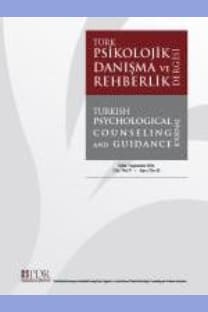Meeting the Career Counseling Needs of European Union in Recession
kariyer gelişimi, Avrupa’daki ekonomik durgunluk, sertifi ka programları
-
career development, European recession, certifi cationprograms,
___
- European Council. (2000). Presidency conclusions: Lisbon European council. Retrieved from http://www. consilium.europa.eu/uedocs/cms_data/docs/pressdata/en/ ec/00100-r1.en0.htm
- Eurypedia. (2014). European ecyclopedia on national education systems. Retrieved from https://webgate.ec.europa.eu/fpfi s/ mwikis/eurydice/index.php/Main_Page
- Hiebert, B., & Hopkins, S. (2012). The EVGP Credential: Acknowledging Guidance Competencies [PowerPoint slides]. Retrieved from presentation at IAEVG conference in Mannheim.
- IAEVG. (2014). International association for educational and vocational guidance. Retrieved from http://www. iaevg.org/iaevg/index.cfm?lang=2
- Splete, H. H., & Hoppin, J. M. (2000). The emergence of career development facilitators. The Career Development Quarterly, 48(4), 340-347. Retrieved from http://search. proquest.com/docview/219442651?accountid=14868
- Stanciu, A. (2013). Global career development facilitator Romania training evaluation and job analysis. CCE Connection, 2(2). Pages 8,11. Retrieved from http:// www.cce-global.org/Assets/newsletter/issues/ WINTER2013_V2-issue2_fi nal.pdf 10
- Stanley, J., & McCoshen, A. (2012) Curriculum reform in Europe : The impact of learning outcomes. [Report]. European Centre for the Development of Vocational Training. Luxembourg: Publications Offi ce of the European Union. Pages 57-58. Retrieved from http:// www.cedefop.europa.eu/EN/Files/5529_en.pdf
- Szilagyi, A. (2008a). The GCDF (Global Career Development Facilitator) certifi cation around the world. Quarterly of Counseling and Guidance: Offi cial Journal of The Hellenic Society of Counselling and Guidance. 86-87.
- Szilagyi, A. (2008b). Career consultant handbook. Iasi, Romania: Institutional European Publishing House.
- Szilagyi, A. (2010). The opportunity of the economic crisis. Career versus work. Quarterly Review of Counseling and Guidance: Offi cial Journal of the Hellenic Society of Counselling and Guidance, 90-91. 163-167.
- Tibu, S. (2013). Youth guarantee and lifelong guidance: Responsibilities of school counsellors in Romania. [PowerPoint slides]. Retrieved from http://nbcc. ro/noutati/Va-multumim-pentru-participarea-la- Conferinta-Internationala-Educatie-si-creativitate- intr-o-societate-bazata-pe-cunoastere-la-sectiunea- Teorie-si-practica-in-consiliere.html
- ISSN: 1302-1370
- Yayın Aralığı: 4
- Başlangıç: 1990
- Yayıncı: -
Andreea SZILAGYI, Marcella PETRINI
Evlenmek Amacıyla Evden Kaçan Kız Ergenler Bir Olgubilim Çalışması
Ergenler İçin Duygu Düzenleme Ölçeği’nin Türkçe’ye Uyarlanması
Ergenler İçin Duygu Düzenleme Ölçeği'nin Türkçe'ye Uyarlanması
Rehberlik ve Psikolojik Danışma Alanındaki Araştırma Eğilimleri: Bir İçerik Analizi
İsmail SEÇER, İsmail AY, Ceyhun OZAN, Burak YILMAZ
Diğdem Müge SİYEZ, Dilek TAN TUNA
Diğdem Müge SİYEZ, Dilek TAN TUNA
Meeting the Career Counseling Needs of European Union in Recession
Andreea SZILAGYI, Marcella PETRINI
Evlenmek Amacıyla Evden Kaçan Kız Ergenler: Bir Olgubilim Çalışması
